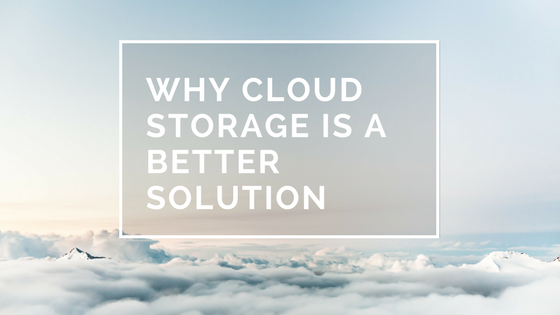Cloud Data Storage is the Safest Option for Small Businesses
I hear it all the time. “I would never put my critical data in the cloud.” It’s a prevailing point of view. Using cloud data storage seems like you’re more vulnerable to privacy invasions, hacking, and other problems.
You are taking a risk by trusting someone else with your data. However, ask yourself this: Is your data really safer if you manage it yourself? Here are a few things you may want to consider.
1) YOU PROBABLY DON’T HAVE A GOOD, ALWAYS-CURRENT BACKUP OF YOUR DATA.
Sure, you run your backup program every so often (maybe even nightly). Perhaps it backs everything up directly to your trusty external hard drive that’s constantly plugged into your computer. Maybe the IT guy comes into the office every so often to swap backup tapes on the server.
But what happens if your house burns down, your office floods, or your laptop and backup drive are stolen? What if a virus deletes all the files on your local hard drive and external drives it’s connected to? What happens if a nearby lightning strike results in a power surge that destroys your laptop and backup? Taking it a step further, how often do you actually test your ability to restore from the backups you create? Do the tapes created by your IT guy actually contain your critical data?
The reality is that there’s no cost-effective backup strategy the typical home-user or SMB can implement that provides a truly secure, always-accessible solution to protecting against all of the scenarios mentioned above unless you leverage the cloud in some way to create off-site backups.
Cloud-based backup solutions give you a simple, cheap back-up in a location other than your home or office. And even if your computer is stolen, damaged, or lost, your backups are intact.
Plenty of online backup solutions today offer fully encrypted backups. Employees won’t even be able to decrypt them. Do your homework before choosing one. A proper backup will mitigate any minimal risk of hacking and protect you from everyday threats.
2) YOUR MOST SENSITIVE PERSONAL INFORMATION IS PROBABLY ALREADY IN THE CLOUD.
Most people don’t understand that their personal data exists in the cloud today, even if you didn’t put it there. Your bank account details exist on the bank’s website. Your credit scores are on the servers of the 3 credit bureaus. Even your travel reservations are on the airline’s website. Hundreds of other pieces of important information about you are out there, waiting for you to view it.
Obviously, these companies go to great lengths to keep your data private. Remember, in many cases, this is data you didn’t even put there, but it’s sensitive information about you, nonetheless.
The point is – you’re not going to avoid this risk by not participating. In many cases, you may be making yourself –more- vulnerable to particular forms of identity theft. You’re likely safer taking an active role in knowing who has your personal information, and managing those accounts carefully.
3) YOUR COMPUTER IS PROBABLY FULL OF SPYWARE, VIRUSES, AND OTHER FORMS OF MALWARE.
Unless we’re talking about true computer-geeks, nearly every Windows home and SMB computer out there has malware installed and running. Even if you run your favorite anti-virus software in the background, virus creators have tried to make their stuff undetectable.
This is a massive risk. Typical spyware will take screen-shots of your activities, scan your hard drive for personal information, or even use your computer as the middle-man in hacking attacks. Nothing on a spyware-infected computer can be considered secure.
The typical business computer user is not professionally qualified to be a system-administrator, and yet that’s what they do. This leaves the door wide open for hackers.
In a cloud scenario, you mitigate this risk by trusting your data to people who are security experts and make their living by providing clean, secure, and hacker-resistant solutions. Do they always get it right? Definitely not. Is your data safer with them, than in your spyware, virus-infected laptop? Absolutely.
4) YOUR LAPTOP CAN BE LOST OR STOLEN
One of the most common arguments people make for not storing their data in the cloud is that they don’t want their documents and data to be stolen. I can certainly respect this, and I understand why someone might feel safer if they keep their data in a place where they see and touch it.
Why, then, does the typical laptop owner leave their computer sitting on the front seat of their car while they stop in for their morning cup of coffee?
If you don’t want your data to be stolen, you’re far better off keeping it in a location where it’s not vulnerable to being lost, damaged, or stolen with one of your devices. Keep it in the cloud. This way, at least you’ll have the peace of mind knowing that, even if someone steals your laptop, they’ve gained access to nothing.
CONCLUSION
The cloud isn’t perfect, but it provides an opportunity for the average SMB employee to step up their game in terms of providing better security, backups, and overall protection in what is otherwise a very dangerous technical landscape. The best option is to put your trust in someone with expertise in these areas.





Comments